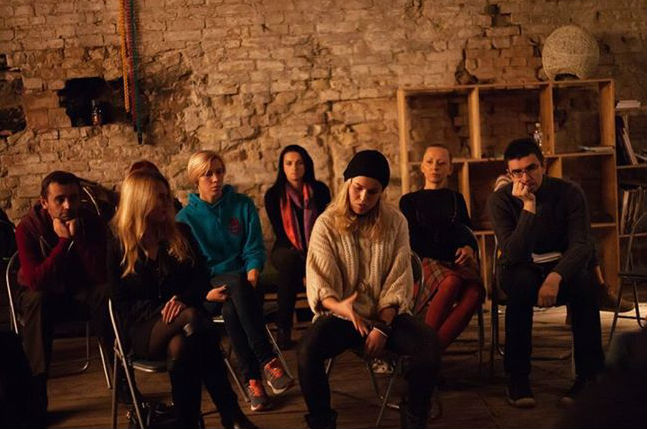 As I was walking up Kyiv’s colorful Andriyivsky descent on December 6, three explosions pierced the quiet evening. No one stopped examining the myriad souvenirs on sale in the booths lining the street, no one showed any fear or ran for cover. On the third explosion, one exasperated man exclaimed “Who the hell is blowing up those bloody firecrackers?” Thankfully, that’s all they were.
As I was walking up Kyiv’s colorful Andriyivsky descent on December 6, three explosions pierced the quiet evening. No one stopped examining the myriad souvenirs on sale in the booths lining the street, no one showed any fear or ran for cover. On the third explosion, one exasperated man exclaimed “Who the hell is blowing up those bloody firecrackers?” Thankfully, that’s all they were.
The blasts brought home a reality that at times seems far from the chic shops and posh restaurants of Kyiv. Although hundreds of miles from the capital, the reality of annexation in the south and war and occupation in the east, a war that continues to claim lives almost daily, despite the Minsk ceasefire agreement, is a constant presence in Kyiv.
That constant presence and its many intrusions on daily lives is captured in the “Gray Zone,” a new theatrical performance I attended on December 4. In an ironic parallel to the plight of refugees displaced by Russia’s annexation of Crimea and the separatist war in the Donbas region, no one has a home, including the play. The four performances held so far have all been in different, hastily arranged venues.
The “Gray Zone” may not have a home, but it has a powerful story of suffering, love, hate, loss, cynicism, understanding and ultimately, even banality. Based on forty-eight hours of taped testimonies of refugees from Crimea and eastern Ukraine, the performance tells the stories of people who have lost their homes, and the lives they once lived: a blogger from Crimea, a doctor from Donetsk, a journalist from Luhansk, a separatist from Slavyansk, an actor, director and others who because of annexation and war, are now forced to live in the “gray zone.”
There is no stage. Randomly arranged fold-out chairs stand in a dimly lit art space, a semi-reconstructed industrial building that was once a factory in Kyiv’s forgotten Tatarka district. The actors sit among the audience, some wander through the door as if they are here for the performance.
Five amateur actors tell the stories of fifteen people, people who long to go home, but cannot:
“Look at me, I’m that Russian-speaking person Putin is protecting,” one of the heroes of the play, a journalist from Luhansk, who was captured and tortured by the separatists, said. “The separatists ‘protected’ me by breaking my back.”
“Ukraine is the place where I live, Crimea is my homeland. Don’t you understand, I was deported!”
“I didn’t leave Donetsk, I simply could not go back.”
“I saw an entire city of dead people”
“I’m from Luhansk. Don’t you understand, I left so much behind, I left behind more than thirty-five types of orchids that I have been growing for years!”
“You know there are places where there is no authority at all. Buses don’t even reach there. One government has left, and no one has replaced them. There is NOTHING there, nothing!”
“I joined the separatists because I needed money. My daughter’s birthday was in two weeks and she asked for a bicycle. There was no work in Donetsk and I had to do something. I joined the separatists, the unit I joined paid well.”
The show premiered in Zaporizhzhia to a mixed response. “[Some of the viewers] wanted to beat us up, for some reason they thought we were Donetsk separatists” said Dan Humennyi, the play’s 28-year-old dramatist.
Uzhhorod was the next city on the planned tour. However, after a radical group threatened to attack the performance there, the western fund underwriting the troupe’s tour pulled the financing. Since then “Gray Zone” has held only two performances in Kyiv. Humennyi wants to take the play to Slavyansk and Severodonetsk, cities that were once under separatist control but have been reclaimed by Ukraine.
“We didn’t want to do this play for the refugees and the displaced but for those who think the war is far away and doesn’t concern them. But the war concerns each and every one of us because war can break into our homes at any moment. Until we are directly touched by such violence, we rarely think about it,” Director Halyna Dzhykayeva said.
Dzhykayeva can speak about the subject with authority; she was displaced from her home in Simferopol.
As the play ended, we were asked to vacate the premises. The space was provided free of charge but only for a limited time. The actors, directors, and dramatists traipsed to another nearby space where we were given ten minutes to discuss the play. When that time was up, we simply stood outside in the sprawling factory courtyard.
This is partisan, political, underground theater. It is fluid and experimental. It is not part of any theater’s standard repertoire. It, like its subjects, the displaced and uprooted refugees, is a theater without a building, without a stage, without a calendar, without tickets, but with an eager audience, hungry to understand the turmoil that has swept them and millions of their compatriots in a whirlwind of violence, recrimination, and death. I hope someone gives it a home, because unlike the refugees, who hope against hope to return to their homes one day, this theater has never had a home.
Irena Chalupa is a Nonresident Fellow at the Atlantic Council. For the 2015-2016 year, she is a Fulbright Scholar researching Soviet-era Ukrainian political prisoners.
Image: The constant presence of war and occupation in Ukraine’s east and its many intrusions on daily lives is captured in the “Gray Zone,” a new theatrical performance. Credit: New Drama Facebook Page
